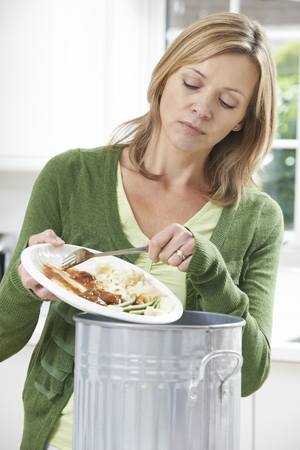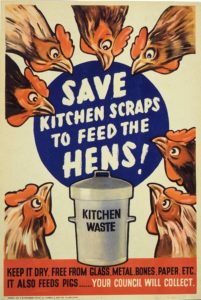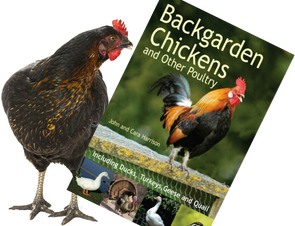A discussion by John Harrison about the law on feeding chickens waste food
 Imagine you have a factory producing sandwiches for the supermarkets and petrol stations etc. Maybe you’re producing 100,000 packs a day or even more.
Imagine you have a factory producing sandwiches for the supermarkets and petrol stations etc. Maybe you’re producing 100,000 packs a day or even more.
Now imagine the worst thing that could happen. Perhaps someone comes in to work with food poisoning and contaminates the product and 100,000 people come down with food poisoning.
Obviously you’re going to take stringent precautions to keep the product as it should be and people safe.
Staff will wear special clothing including hair and beard guards. Disposable gloves will be worn.
Temperatures of the storage taken and recorded regularly – perhaps every hour.
Suppliers will be subject to similar rules and everything will be checked and double-checked. You get the picture.
Now, since businesses have a tendency to bend or break rules to save money, we’ll back these rules and regulations up with the force of law and inspectors will visit to make sure all is as it should be. Penalties for breaking the law will go as far as imprisonment. In view of the risks if something goes wrong, this makes good sense.
Now let’s apply those laws to anyone and everyone who makes a sandwich or any food for that matter.
Imagine the scene – the Oxo family of Dad and two kids sit at the table whilst Mum dishes up a meal. Suddenly there’s a knock at the door. Dad opens it and in walks.. The Health Inspectors.
“We notice you’re not wearing approved clothing, Mrs Oxo. Where are your refrigerator temperature records? Why do you not have a separate hand-washing facility?”
The next scene is Mrs Oxo standing tearfully in the dock as the judge passes sentence. “Two Years! Take her down!”
Think that’s ridiculous? Insane? – Read on!
Feeding Chickens Waste Food (Kitchen Scraps)
Technically you can get two years in prison for feeding your pet chickens kitchen scraps. Hens are livestock and the law doesn’t differentiate between home owners with a couple of birds and agribusiness operations with 100,000 birds.
Food that is fine to serve to the family is illegal to feed to your chickens. Even a tin of spaghetti in tomato sauce freshly opened and heated in the kitchen.
It gets crazier. You pick a cauliflower and cut the leaves off on the plot. It’s fine to feed those leaves to your hens. Take the cauliflower into your kitchen, cut the leaves off and it is illegal to feed those to your hens.
The reason is to prevent contamination with meat or or meat products. There is an exception to the kitchen scraps law – vegan households. However, to quote from the government web site:¹
There is a complete ban on using kitchen waste from non-vegan households and from catering waste containing products of animal origin. It is illegal to use catering waste from kitchens which handle meat, or vegetarian kitchens which may handle dairy products, eggs etc. This ban also includes catering waste from restaurants and commercial kitchens producing vegan food.
The Reasoning Behind the Law on Feeding Kitchen Waste to Chickens
The reason for this legal madness is to prevent the chickens contracting a disease from contaminated food including meat products and passing it on. The Animal and Plant Health Agency state:²
This is to prevent the introduction and spread of potentially devastating notifiable animal diseases, such as African and Classical Swine Fever, and Foot and Mouth disease. These diseases cause significant animal health and welfare problems and damage to the economy.
Does this make sense?
I really don’t think this law makes sense when applied to home poultry keepers. Back before we allowed the bureaucrats to rule us, it was usual to keep a mash bucket for the hens under the sink.
Properly boiled up those potato peelings, stale bread and so forth went into the hens to be converted to nutritious eggs and valuable nitrogen-rich fertiliser.³
Of course, there were sensible rules to follow for the hens’ health but for many years we managed without the full force of the law hanging over us.
Pigs and Kitchen Waste
The other animal that was commonly fed waste was, of course, the pig. The swill bin was a fixture of school and commercial kitchens. But this is now illegal. The Animal and Plant Health Agency say to support their reasoning:²
The most likely source of the Foot and Mouth disease outbreak in 2001 was pigs being fed undercooked catering waste containing the virus which originated from outside the UK. The outbreak resulted in the destruction of more than 10 million cattle and sheep, with compensation running into many millions of pounds.
If I recall accurately the most likely reason was pigs being fed on undercooked catering waste that included illegally imported meat. So it wasn’t the catering waste as such, it was illegally imported meat and a failure to process the waste properly. Two failures that reinforced each other with catastrophic results.
If the infected meat hadn’t been illegally imported then we most probably would have been OK or if the waste had been properly processed we would have been fine.
It’s worth noting that the 2007 outbreak of foot and mouth disease was caused by poor bio-security procedures at the Pirbright viral research laboratory.
Why ban kitchen waste in animal feeding?
After all, we didn’t ban viral research laboratories after the 2007 outbreak. One hopes bio-security was taken more seriously and better applied though.
The logical course of action after the 2001 foot and mouth outbreak would have been to look at better prevention of illegal meat imports whilst ensuring the safe handling of waste foodstuffs in the animal food chain.
The safe handling of waste foodstuffs to feed animals could have been accomplished by regulation and education. People are more likely to follow rules that they know, understand and agree with the reason for.
Instead we have a law that many home poultry keepers are not aware of and free discussion of feeding hens on scraps could be considered incitement to break the law. This is counter-productive as giving specific advice on safely treating waste food to feed pet hens, say on a forum, risks legal action.
That’s a real risk, by the way. Not just theoretical. I’ve had menacing emails from official agencies for suggesting popping a few slug pellets in with stored potatoes as a ‘misuse of pesticide’.
The Animal and Plant Health Agency proudly say:²
APHA and Trading Standards continue to find and investigate incidents where farmers and smallholders are illegally feeding pigs and poultry with catering waste, often because they are unaware of the disease risk posed to their livestock by giving them this type of food.
I’d suggest it’s far more sensible and safe for everyone for those farmers and smallholders to be feeding their livestock on scraps legally and openly rather than in secret. That way their processing methods could be checked and supported with advice
How is food waste handled now?
Some councils now separately collect food waste from households and much catering and supermarket waste food etc. ends up in biodigesters. Here the waste goes into a system that produces methane gas which is burnt to produce electricity that is sold into the grid.
To encourage biodigesters the government was paying a large subsidy to the owners. So the owners naturally disposed of wastes like slurry from dairy farms in the biodigesters and even started growing crops to digest!
The subsidy comes from the taxpayer and generally benefits those who were wealthy enough money to invest large amounts of money in the equipment.
Who benefits from the current law?
There is, of course, the argument that the law protects the farming industry from disease and changing it would be a grave risk to the economy and cost to the taxpayer.
The owners of biodigesters obviously benefit although the reduction of the government subsidies means there are not a great number of new ones coming on stream now.
The largest beneficiary has to be the animal feed industry. Buying and processing food waste for animal feed is of necessity distributed and small scale. Manufacturing and importing processed animal feed is ideal for large international corporations.
My Opinion About Feeding Food Waste to Chickens and Other Livestock
My opinion is that the current law fails to protect the industry and the illegal feeding actually could be a greater risk. It technically criminalises home poultry keepers for following a practice that has been followed for hundreds of years.
I’d like to see the risks, if any, of feeding chickens and other livestock properly analysed and quantified by independent researchers. That is researchers not funded by businesses with vested interests or government agencies whose relationship with big businesses is far too cosy for my liking.
I have no faith in those agencies when they make sweeping statements of risk without openly publishing the research and logic that backs it up.
To me, feeding waste food to animals who turn it into high value edible food and high grade fertiliser makes perfect sense. Especially when carried out at a local level.
What do You Think?
I would love to know what you think on this – please use the comments box below but do be aware that comments are manually approved because of spam – so may take a little while to appear. It would be really helpful if you could let your friends know by liking or tweeting this page.
References:
- Supplying and using animal by-products as farm animal feed Supplying and using animal by-products as farm animal feed
- APHA warns not to feed kitchen scraps to farm animals because of disease risk
- Feeding Chickens on Food Scraps and Waste Food



My grandparents kept pigs,chickens and rabbits they were supplemented by kitchen scraps. We survived two world wars by using this system. I’m not allowed chickens at my allotment, next door neighbours had some but they didn’t last very long, probabally due to lack of available reliable information.
Meat scraps from non vegan households did not cause foot n mouth, most hen owners serve their hens insects/slugs. Big business always tries to muscle in and scare little people.